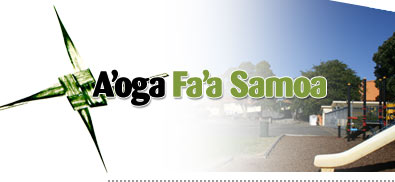 |
 |
|||||||
 |
 |
 |
 |
 |
||||
 |
||||||||
 |
||||||||
| Aoga Fa'aSamoa Resources | ||||||||
AOGA EVENTS CALENDAR 2024
|
|||||||||||||||||||||||||||||||||||||||||||||||||||||||||||||||||||||||
The Value of Culture and LanguageThe Aoga Fa’a Samoa was the first licensed Samoan Language Early Childhood Centre in New Zealand. It is the only licensed Samoan Centre that is part of a Primary School that has a Samoan language programme. This unique situation has been written about in education papers and published books. (May 1990. Cazden 1989) Research has shown, both here in New Zealand and overseas, that if children can learn in the language of their own home, they will feel secure and confident so enabling interactions to occur between teacher and child. Log tern research studies have been conducted on the effects of the child being immersed in their home language during the pre-school years. Cognitive developmental gains of the children are shown in Mathematics, Science, Reading and Music (Savaille – Troike, 1982). This is also supported from research findings that have shown positive gains for Maori children who have progressed through Kohanga Reo and moved into Kura Kaupapa (Smith, 1986).
An article “Fertile Minds” published by Time magazine states that “the ability to learn a second language is highest between the birth and the age of six, then undergoes a steady and inexporable decline” (Time Magazine, 1997) In “Talking Past Each Other” Joan Metge and Patricia Kinlock state “ It is in Early Childhood that children are still developing mastery of their parental culture and are also open to other influences. Early Childhood educators can help them sort out their confusions – or compound them with potentially disastrous results” (Metge, J & Kinlock, P. 1984) For children from a different culture other than that of the dominant culture, observation is not enough. How much value is observation if what we see is misinterpreted, or not understood through misunderstanding? If this is to be avoided it is important for educators to know something of other cultures – their ways of communication and their value systems. Why do children of minority groups so often come under the heading of ‘at risk or problem children’? When looking for the reasons for problem behaviour, we cannot put all the blame on somebody else. We must look at ourselves, the organization, the attitudes, and the hidden curriculum. Children need an environment where they can feel at ease and are confident of support. Where the whole context of what we do with children is meaningful to their environment, culture, interests and needs – both developmental and for the future. If we value cultural diversity, it must be embedded in the total pre-school environment. Whether we have children from other cultures in our pre-schools or not we are all members of a multicultural society, and language learning is relevant to all children. Children who do not speak English learn quickly and they will be fortunate in being bilingual – an advantage shared by few New Zealanders. Silence often makes us uncomfortable. We try to fill it with words. One of the hardest lessons is to accept the silence of other cultures, and to understand that a great deal of thought and decision making is going on. (Smith, M. 1981) Summary References |
|||||||||||||||||||||||||||||||||||||||||||||||||||||||||||||||||||||||